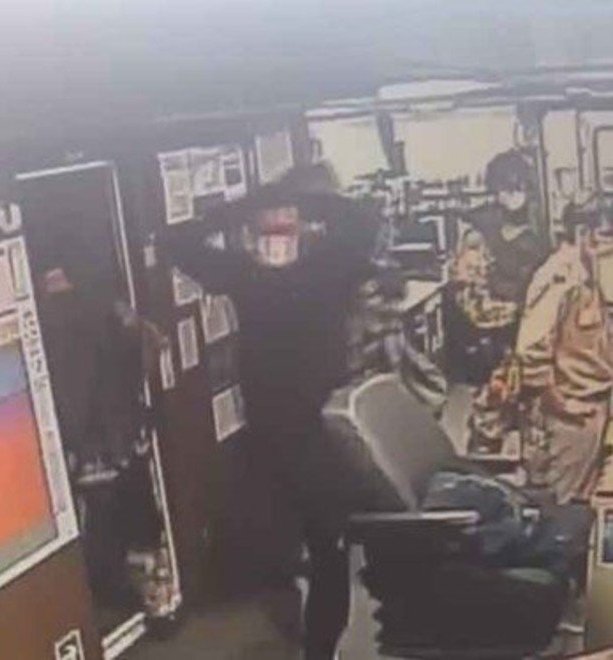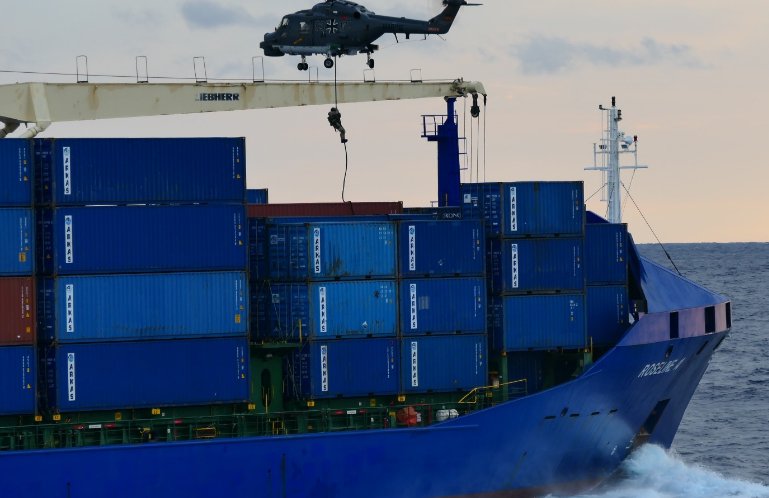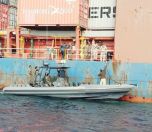The moment Germany's soldiers board on the cargo vessel. (Photo: Operation Irini)
Click to read the article in Turkish
Turkey continued to criticize the EU over the search of a Libya-bound civilian vessel on Sunday (November 22) by Operation Irini, a mission set up to enforce a UN arms embargo on Libya, which has been torn by war since 2011.
Ankara supports the Tripoli-based Government of National Accord (GNA) in the war and says that the arms embargo effectively serves the House of Representatives and its ally Khalifa Haftar's Libyan National Army (LNA).
CLICK - Turkey summons envoys of EU, Italy, Germany over search of ship heading to Libya
Minister of Foreign Affairs Mevlüt Çavuşoğlu last night accused the Germany-flagged frigate of violating international law when it stopped and searched a commercial vessel without the consent of its flag-state or its captain.
"It is a violation of international law to embark on trade ships like pirates," Çavuşoğlu told reporters in the capital city of Ankara.
Çavuşoğlu underlined that both Turkey's Foreign Ministry and its Embassy in Rome, where the headquarters of Operation Irini under which the frigate Hamburg was operating, had made the necessary warnings against the boarding action that it could not be lawfully carried out without the permission of the flag state.

He added that they negotiated on the issue with the UN, NATO and the International Maritime Organization.
"We'll follow the political and judicial process of the issue. We won't let go of this incident," he said.
Çavuşoğlu went on to say that Ankara would do whatever is necessary: "Our president's instructions are in this direction as well. We cannot leave anything done to us unanswered."
"We will not only respond on the field but follow the judicial and politic processes, as well," he added.
Stano: The inspection was in accordance with NATO procedures
EU Commission spokesperson Peter Stano said in a statement that officials of the Greece-led Operation Irini suspected violations of the UN arms embargo on Libya due to the course of the Roseline A cargo vessel.
Stano argued that prior to the inspection, Operation Irini gave a four-hour notice to Turkey's Foreign Ministry as the flag state and agreed to extend the notice by an hour upon the request of the Turkish Embassy in Rome, where the operation's headquarters are located, said Stano.
"Having received no answer from Turkey after the elapsed time, Operation IRINI boarded the vessel and inspected it in accordance with internationally agreed procedures including NATO procedures," he said.
"The inspection was suspended later on when Turkey formally and with delay notified Operation IRINI of its refusal to grant the permission to inspect the vessel. Until then, the inspection had found no evidence of illicit material on board and the vessel was cleared to pursue its route," he added.
"Freedom of navigation"
Replying to claims of Peter Stano, the EU's spokesperson for external relations, the Foreign Ministry said on Twitter: "@EUNAVFOR_MED [Operation Irini] boarded Roseline-A unlawfully and forcefully w/out the flag state consent & ignored the written and oral messages sent by Turkish authorities before the unlawful boarding."
Stating that Operation Irini changed its position after Ankara protested against the "unlawful" search of its vessel, despite claiming earlier that they did not need the consent of the flag state.
"When Turkey protested this unlawful boarding & reserved its rights for compensation, IRINI changed its position & realized that they could not board the ship without the flag-state consent," it said, adding: "International law and freedom of navigation should be respected, at all times."
Defense Ministry: The crew were treated like criminals
A German frigate that forcefully and unlawfully boarded a Turkey-flagged cargo vessel in the Eastern Mediterranean Sea did so without the consent of flag state and captain, Turkey's National Defense Ministry said last night.
In a written statement, the ministry noted that UN Security Council resolution 2292 required consultations and permission from the Libyan government to search vessels as part of the UN arms embargo on Libya, where the cargo ship was headed.
Despite this, the Operation Irini, under which the German frigate Hamburg was operating, was initiated in March by the EU in the Eastern Mediterranean Sea without satisfying these requirements.
The crew of Rosaline-A was questioned via radio by the German Hamburg frigate at around 12.30 p.m. local time [0930 GMT], it recounted.
"Afterwards, the Irini Operations Center asked for permission to search the vessel. The Government of the Republic of Turkey informed the Irini Operations Center at 5.44 p.m. [1444GMT] that it did not give permission for the vessel to be searched," the ministry said.
"Despite not having the consent of the flag state and captain of the ship, the German frigate's armed and equipped search team boarded the vessel via a helicopter at 6 p.m. [1500 GMT] by force."
The ministry added that the team had conducted a thorough search and left the vessel on the next morning at 9.30 a.m. [0630GMT] again via helicopter.
Treating the search team of treating the Rosaline-A's crew "like criminals" during the roughly 16-hour search when they were gathered in a single place, it went on to say that the search was terminated upon Turkey's persistent protests, as well as the failure to find a "suspicious situation" on board as the cargo consisted only of flour, oil, biscuits, meat, cosmetics, health, and "similar consumption and construction supplies."
The ministry said it was worrying that such an "unlawful practice" was carried out by an allied navy.
AKP: Turkey supports the legitimate government
The spokesperson of the ruling Justice and Development Party (AKP), Ömer Çelik, also protested the interception of the cargo vessel.
"We strongly protest the search carried out on our ship by the German warship as part of Operation Irini operated by the EU," he said.
Çelik said Turkey supported the legitimate government in Libya and that it was not the Turkish side that breached the arms embargo on the war-torn North African country.
He underlined that Operation Irini was launched without consulting NATO and that its neutrality was already questionable, adding that the search on the Turkish ship without Ankara's consent further compromised this neutrality.
He went on to urge the EU to end Operation Irini. (VK)





-132.jpg)
